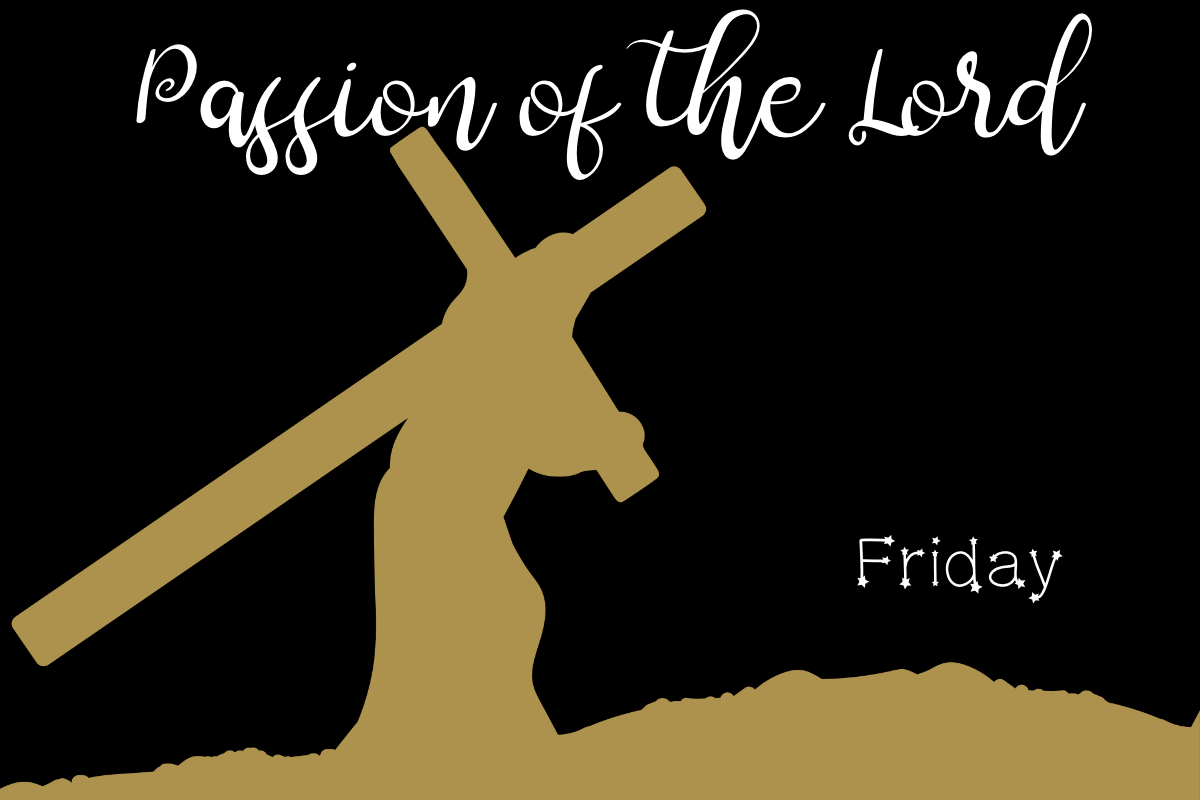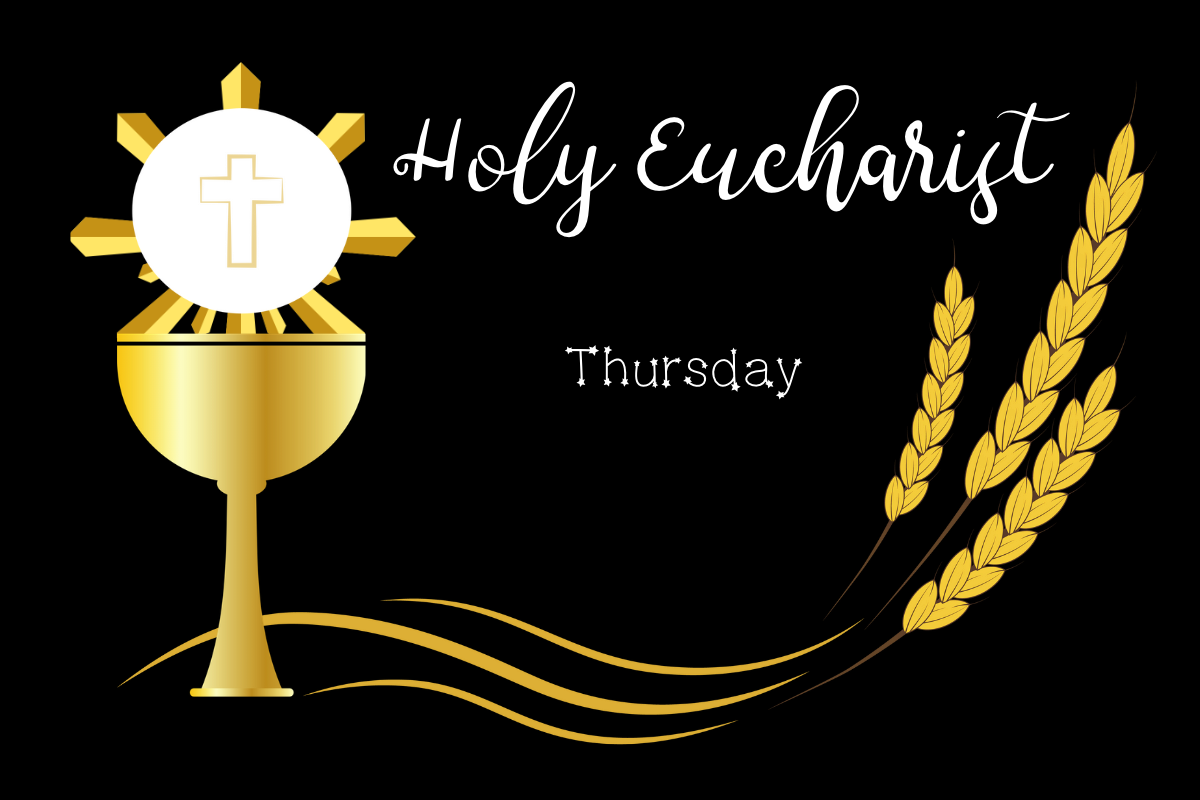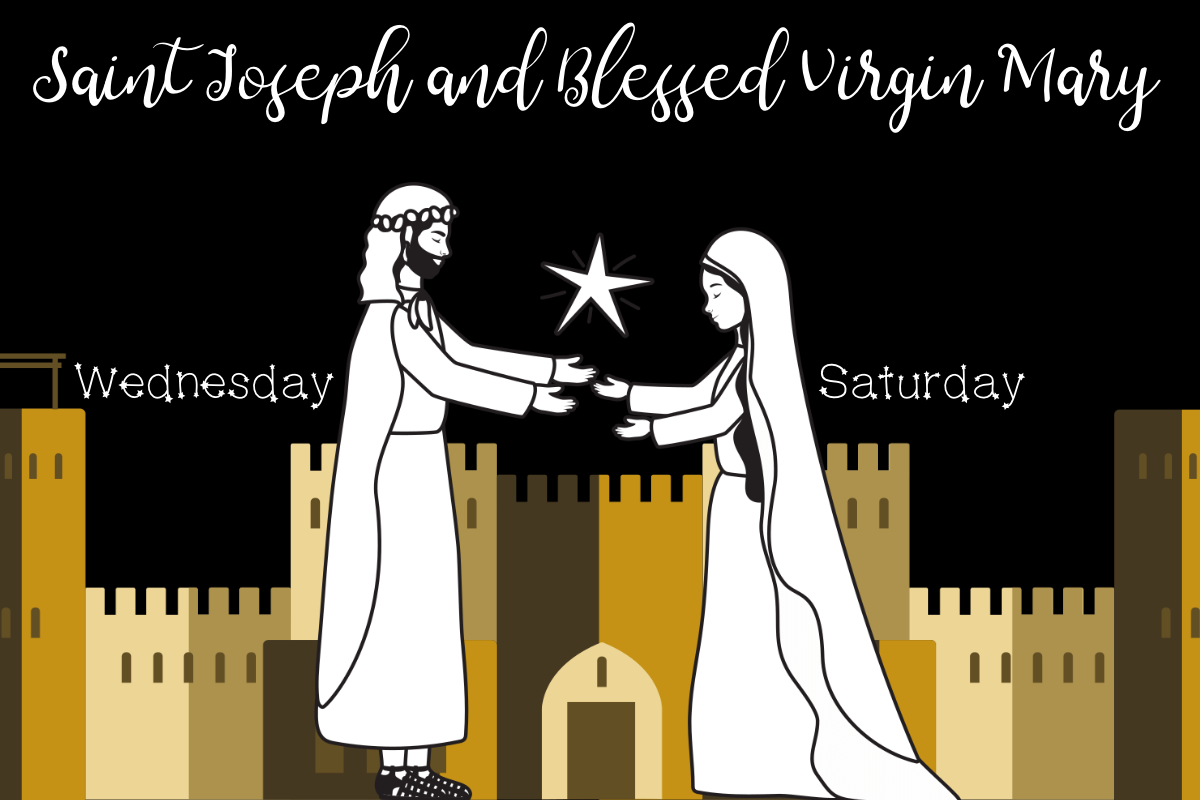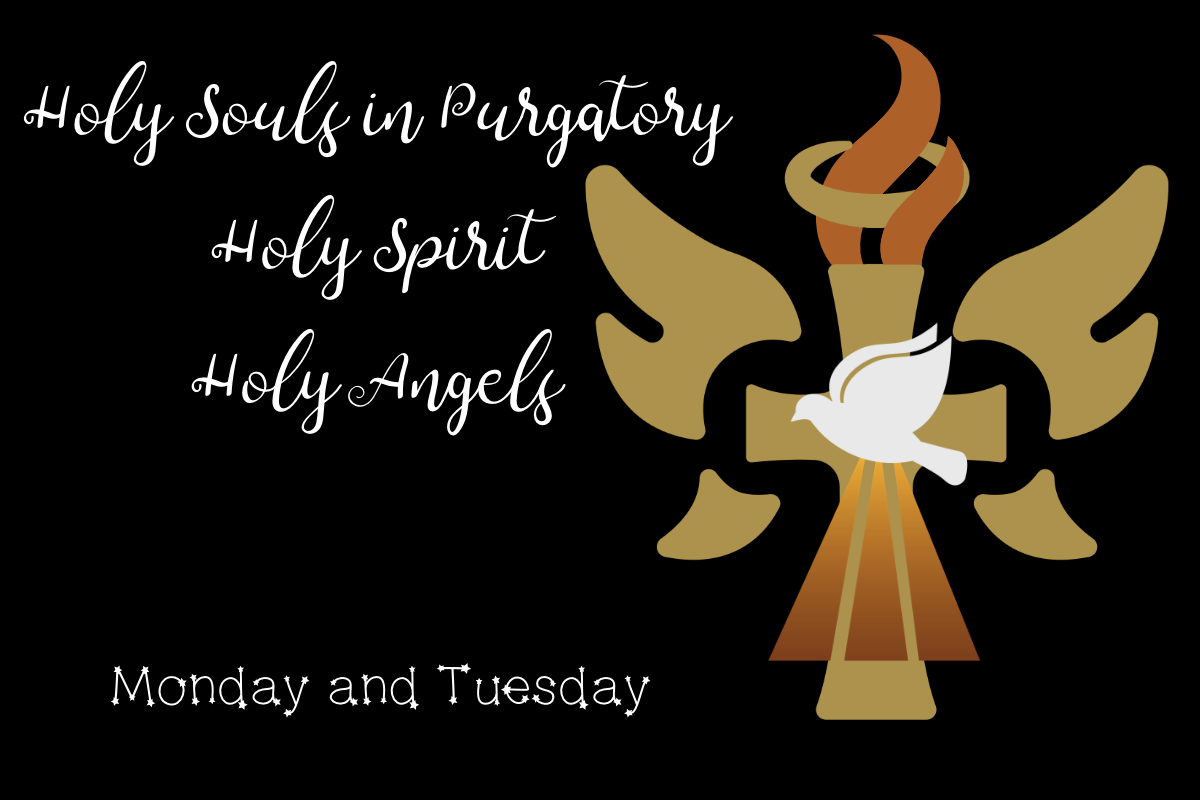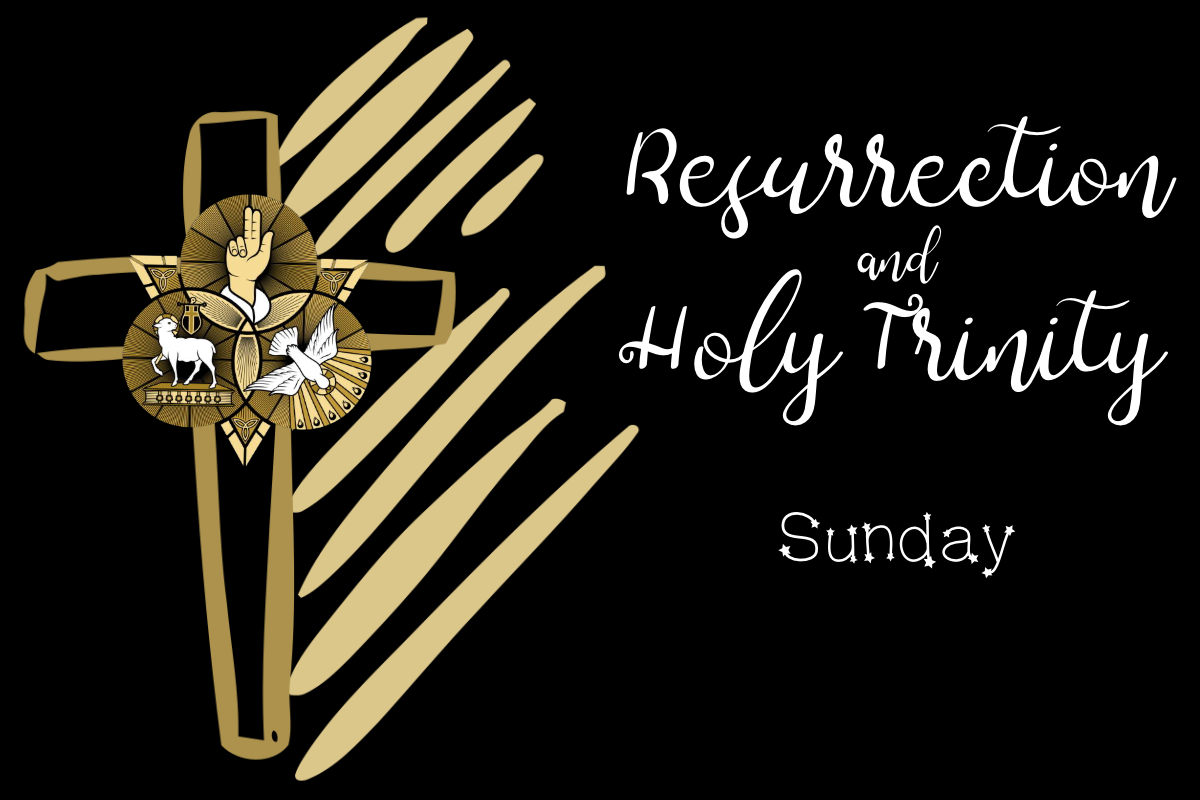Week Beginning January 22, 2023
Holy Eucharist
The Holy Eucharist is forever associated with Thursdays, because Jesus institutes the Holy Eucharist on Holy Thursday. In Sacrosanctum Concilium, Pope Saint Paul VI explains the most sacred mystery of the Eucharist.
“At the Last Supper, on the night when He was betrayed, our Savior instituted the eucharistic sacrifice of His Body and Blood. He did this in order to perpetuate the sacrifice of the Cross throughout the centuries until He should come again, and so to entrust to His beloved spouse, the Church, a memorial of His death and resurrection: a sacrament of love, a sign of unity, a bond of charity, a paschal banquet in which Christ is eaten, the mind is filled with grace, and a pledge of future glory is given to us.”
The Decree Concerning the Most Holy Sacrament of the Eucharist from the General Council of Trent details transubstantiation and professes, “in the august sacrament of the holy Eucharist, after the consecration of the bread and wine, our Lord Jesus Christ, true God and man, is truly, really, and substantially contained under the species of those sensible things.” Saint Angela of Foligno notes: “If we paused for a moment to consider attentively what takes place in this Sacrament, I am sure that the thought of Christ’s love for us would transform the coldness of our hearts into a fire of love and gratitude.” Saint Thomas Aquinas teaches us: “The Eucharist is the Sacrament of Love. It signifies love, it produces love. The Eucharist is the consummation of the whole spiritual life.” The heavenly blessings and graces associated with this sacred feast unite us in charity and love, nourish and strengthen our souls, heal our sinful tendencies, and deliver us closer to God. Pope Saint Pius X says, “Holy Communion is the shortest and safest way to heaven.”
The Catechism of the Catholic Church details the many fruits associated with reception of the Eucharist. The principal fruit of receiving Holy Communion is an intimate union with Jesus Christ (CCC 1391). It nourishes our spiritual life by preserving, increasing, and renewing the life of grace we receive at Baptism (CCC 1392). It separates us from sin (CCC 1393); it wipes away venial sins, restores lost strength, increases our charity, and orients us toward God by easing our disordered attachments (CCC 1394); it preserves us from future mortal sins (CCC 1395). Through the unity of the Mystical Body, the Eucharist makes the Church (CCC 1396) by fulfilling and deepening our baptismal call to form one body (1 Corinthians 12:13). Additionally, receiving Holy Communion commits us to the poor by enabling us to recognize Christ in the least of our brethren (CCC 1397). Saint Maximilian Kolbe contemplates, “If angels could be jealous of men, they would be so for one reason: Holy Communion.”
Holy Thursday also provides the scriptural root for the institution of holy orders. Ordained priests act in persona Christi capitis, or “in the person of Christ the Head of the Church.” Jesus, sacramentally present in ministerial priests, unites His one sacrifice to God the Father with the spiritual sacrifices of all the baptized in the celebration of the Eucharist. The General Instruction of the Roman Missal states:
“At the Last Supper Christ instituted the Paschal Sacrifice and banquet, by which the Sacrifice of the Cross is continuously made present in the Church whenever the Priest, representing Christ the Lord, carries out what the Lord himself did and handed over to his disciples to be done in his memory” (GIRM 72).
Our Thursday dedication to the Holy Eucharist would be incomplete without also recognizing the apostles and their successors. Only through our most gracious priests are we able to experience the loving gift of the Blessed Sacrament. Saint Francis de Sales articulates the process:
“When the bee has gathered the dew of heaven and the earth’s sweetest nectar from the flowers, it turns it into honey, then hastens to its hive. In the same way, the priest, having taken from the altar the Son of God (who is as the dew from heaven, and true son of Mary, flower of our humanity), gives him to you as delicious food.”
This week, consider the many ways you can participate in our Thursday devotion to the Eucharist, including adoration of the Blessed Sacrament and acts of spiritual communion. Remember to pray for our priests and to thank them for their service. Ponder this question: if absolutely everything you need to live has to pass through an opening of only two inches in diameter, can you survive?
One answer is “yes,” because the Body, Blood, Soul, and Divinity of Our Lord Jesus Christ can sustain us when we open ourselves to receiving the Holy Eucharist.
Week Beginning January 15, 2023
Saint Joseph and Blessed Virgin Mary
Pope Saint John Paul II observes: “Whereas Adam and Eve were the source of evil which was unleashed on the world, Joseph and Mary are the summit from which holiness spreads all over the earth.” Even before the birth of Jesus, this Holy Couple demonstrates their openness to faithful cooperation with God. As the earthly parents of Jesus, they devote their lives to supporting, loving, and protecting our Lord, despite personal sacrifices and difficulties.
It is fitting that we dedicate Wednesday–the middle of the week–to Saint Joseph. Saint Joseph represents a mid-point in biblical history with both his lineage and patriarchal traits recalling the Old Testament and his participation in the story of salvation transitioning into the New Testament. As the father figure for Jesus, Saint Joseph occupies a central role in the Holy Family. Tradition states that Saint Joseph’s death also marks a turning point in the life of Jesus, with the public ministry of Jesus beginning after the death of his foster father. Today, Saint Joseph continues his fatherly guardianship of Christ’s body, the Universal Church, in his focal position as her prince and patron. He remains in the center of our lives as the patron saint of families, fathers, workers, and almost everything else. “Some Saints are privileged to extend to us their patronage with particular efficacy in certain needs, but not in others; but our holy patron Saint Joseph has the power to assist us in all cases, in every necessity, in every undertaking,” remarks Saint Thomas Aquinas.
Saint John Henry Newman teaches us how Saint Joseph is a model for holiness:
“He is Holy Joseph, because according to the opinion of a great number of doctors, he, as well as Saint John Baptist, was sanctified even before he was born. He is Holy Joseph, because his office, of being spouse and protector of Mary, specially demanded sanctity. He is Holy Joseph, because no other Saint but he lived in such and so long intimacy and familiarity with the source of all holiness, Jesus, God incarnate, and Mary, the holiest of creatures.”
Saint Josemaría Escriva explains how Saint Joseph is a model for developing our interior lives:
“In human life, Joseph was Jesus’ teacher in their daily contact, full of refined affection, glad to deny himself to take better care of Jesus. Isn’t that reason enough for us to consider this just man, this holy patriarch, in whom the faith of the Old Covenant comes to full fruition, as a master of interior life? Interior life is nothing but continual and direct conversation with Christ, so as to become one with him.”
Saint Teresa of Avila recommends devotion to Saint Joseph as a way to grow in spirit and virtue:
“Knowing by experience Saint Joseph’s astonishing influence with God, I would wish to persuade everyone to honor him with particular devotion. I have always seen those who honored him in a special manner make progress in virtue, for this heavenly protector favors in a striking manner the spiritual advancement of souls who commend themselves to him.”
The dedication of Saturdays to the Blessed Virgin Mary is centuries old and derives partially from liturgical intentions and partially from historical events. Saint Peter Damascene attributes it to the completion of God’s work on Saturday. God rests on the seventh day, and Mary is made the holy resting place for the Lord through the mystery of the incarnation. Other theologians like Saint Bernard, Saint Thomas Aquinas, and Saint Bonaventure credit Mary for consoling the disciples and waiting in joyful hope on Holy Saturday. A fifteenth-century Dominican missal celebrates Saturday as the day the plan of salvation, which finds its realization through Mary, is fulfilled. Recognizing Sunday as the Lord’s Day, the preceding day honors Mary who provides both our way to the Lord and his way into this world.
The Blessed Virgin Mary has a uniquely intimate relationship with the Holy Trinity. As the Beloved Daughter of the Father, she is created more purely and perfectly than any other woman. As the Mother of the Son, she is the Mother of God. As the Spouse of the Spirit, she is the Mediatrix of all Graces. Today, our Blessed Mother intercedes for us as the merciful Queen of Heaven.
Saint Thomas Aquinas notes: “Mary means Star of the sea, for as mariners are guided to port by the ocean star, so Christians attain to glory through Mary’s maternal intercession.” Saint Bernard of Clairvaux assures us: “If the hurricanes of temptation rise against you, or you are running upon the rocks of trouble, look to the star–call on Mary!”
Pope Saint John Paul II hails Mary as an exemplar in our pilgrimage of faith:
“From Mary we learn to surrender to God’s will in all things. From Mary, we learn to trust even when all hope seems gone. From Mary, we learn to love Christ, her Son and the Son of God…Learn from her to be always faithful, to trust that God’s word to you will be fulfilled, and that nothing is impossible with God.”
Devotions to Saint Joseph and the Blessed Virgin Mary will always lead us to a closer relationship with Jesus. This week, explore the numerous traditions–ranging from simple prayers to total consecration–available to increase our faith through the Holy Couple. Reflect upon the lives of Saint Joseph and our Blessed Mother, and consider the many qualities that made them God’s choice to become His earthly parents. Think about their unwavering obedience to God and acceptance of His will. How can we imitate their humility and fidelity in our relationships? How can their examples of discernment and contemplation help us listen to God? How can we develop our interior lives using them as our spiritual guides? Think about how they handled their difficulties. With the Holy Couple as our role model, how can we overcome issues and respond to conflicts? How can we use those situations to grow in love for God and for each other?
Week Beginning January 1, 2023
Resurrection and Holy Trinity
In several Romance languages, the word for Sunday translates to the “Lord’s day.” Saint Jerome explains: “The Lord’s day, the day of Resurrection, the day of Christians, is our day. It is called the Lord’s day because on it the Lord rose victorious to the Father. If pagans call it the ‘day of the sun,’ we willingly agree, for today the light of the world is raised, today is revealed the sun of justice with healing in his rays.” Saint Justin Martyr observes: “We all gather on the day of the sun, for it is the first day when God, separating matter from darkness, made the world; and on this same day Jesus Christ our Savior rose from the dead.”
The Catechism of the Catholic Church teaches us: “Sunday is the pre-eminent day for the liturgical assembly, when the faithful gather ‘to listen to the word of God and take part in the Eucharist, thus calling to mind the Passion, Resurrection, and glory of the Lord Jesus, and giving thanks to God who ‘has begotten them again, by the resurrection of Jesus Christ from the dead’ unto a living hope’ (CCC 1167).
The glorious mystery of the Resurrection holds richness worthy of contemplation throughout our lifetimes. The Resurrection commends divine justice and proves that Jesus Christ is the Son of God who conquers sin and death. As the efficient and exemplar cause of our own resurrections, Jesus fills us with hope. His Resurrection orients us toward new and eternal life. With the help of God, we are inspired to follow the example of Christ and advance toward beatitude.
Christ’s humanity is glorified as the grace of the Resurrection radiates throughout his body and soul. He becomes impassable–free from suffering–and incorruptible–preserved by the power of God. His body is proportioned to spiritual life, perfectly subject to his soul, and elevated with splendor and clarity. His human nature is perennially exalted as he reigns forever at the right hand of God the Father.
We know the almighty and omnipotent God, the uncreated Creator, as the Holy Trinity through divine revelation. This mystery of God’s inner life reveals that God is one in essence and three in person. As one essence, all divine persons possess the fullness of the single divine nature and exist together eternally as God. The Prologue of the Gospel According to John states: “In the beginning was the Word, and the Word was with God, and the Word was God” (John 1:1). The Greek Logos meaning “Word,” is interpreted to convey the concept of rationality, wisdom, or spiritual thought. God the Father, the origin of Trinitarian life, eternally generates or begets the Son in His image through one perfect act of self-understanding. The Word, therefore, proceeds from the Father by way of intellect. He is the wisdom of the Father who becomes human for our sake. The Father and the Son breathe forth or spirate the Holy Spirit, who proceeds from them by way of love. We refer to the Holy Spirit as “Love” or “Gift,” because love is the reason for a truly gratuitous gift. The Holy Spirit sanctifies the Church and enables us to be united to God through grace and spiritual gifts. We are led to God the Father through the persons of the Son and the Holy Spirit.
This week, reflect on how you can incorporate a dedication to the Resurrection and the Holy Trinity into your Sunday routine. When you attend Mass, celebrate the Paschal Mystery as a “little Easter.” Treat Sundays with reverence by honoring the Triune God through public worship, charitable acts, family time, and rest.
Increase your familiarity with the each of the three divine persons through conversation, study, and prayer. Pope Francis reminds us: “Everything, in Christian life, revolves around the mystery of the Trinity and is fulfilled in this infinite mystery. Let us look, therefore, to keep high the ‘tone’ of our life, reminding ourselves to what end, for what glory we exist, work, struggle, suffer; and to which immense prize we are called [to have].”
